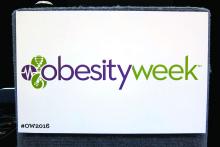NEW ORLEANS – Prepregnancy overweight and obesity are associated with increased incidence and severity of depressive symptoms during pregnancy, independent of preeclampsia and other hypertensive pregnancy disorders or gestational diabetes, Satu Kumpulainen reported at Obesity Week 2016.
The implications of this novel finding are clear: “Prepregnancy interventions targeting overweight and obesity and mental health will not only benefit the pregnant mother’s health but will also provide optimal odds for healthy development of the fetus as well,” said Ms. Kumpulainen, a doctoral student at the University of Helsinki Institute of Behavioral Sciences.
She presented a secondary analysis from the prospective Finnish Prediction and Prevention of Preeclampsia and Intrauterine Growth Restriction (PREDO) study. The analysis included 3,078 Finnish women with a prepregnancy BMI measurement who recorded any depressive symptoms that arose during their pregnancy by completing the Center for Epidemiological Studies-Depression scale (CES-D) every 2 weeks from gestational week 12 onward.It’s well established that prepregnancy obesity is a risk factor for gestational diabetes, preeclampsia, and depression during pregnancy. This study was carried out to learn if a high prepregnancy BMI boosts the risk of prenatal depression independent of the cardiometabolic complications of pregnancy, Ms. Kumpulainen explained at the meeting, which was presented by the Obesity Society and the American Society for Metabolic and Bariatric Surgery.
This proved to be the case in the Finnish women, 67.3% of whom were normal weight before pregnancy; 19.1% were overweight and 13.6% obese. Gestational diabetes occurred in 10.6% of the PREDO participants, and hypertension-spectrum disorders of pregnancy occurred in 8.2%.
The women who were obese or overweight prepregnancy reported higher rates of clinically meaningful depressive symptoms throughout pregnancy, compared with women who were normal weight. Using a CES-D score of 16 or more to define clinically significant depressive symptoms, such symptoms were reported as early as gestational week 12 and on multiple occasions thereafter by 19.9% of the women who were normal weight before pregnancy, 23.3% of those who were overweight, and 27.4% of those who were obese. The differences were statistically significant.
The risk of clinically significant depressive symptoms during pregnancy was no higher in prepregnancy normal-weight women who developed gestational diabetes or preeclampsia than in those who did not, Ms. Kumpulainen reported.
In contrast, a multivariate analysis adjusted for maternal age, educational level, smoking, alcohol intake, and parity showed that the risk of clinically significant depressive symptoms in overweight women without a cardiometabolic pregnancy disorder was 28% higher than in normal-weight women without a cardiometabolic disorder, and similarly elevated at 32% higher in overweight women who developed a cardiometabolic pregnancy disorder. Moreover, compared with normal-weight women without a cardiometabolic pregnancy disorder, the risk of clinically significant depressive symptoms during pregnancy was an adjusted 51% higher in obese women without a cardiometabolic pregnancy disorder and a similar 56% higher in those with a cardiometabolic pregnancy disorder.“Our findings suggest that cardiometabolic pregnancy disorders per se don’t trigger higher levels of depressive symptoms, but women with prepregnancy overweight and obesity feel more depressed right from the beginning of pregnancy,” Ms. Kumpulainen said.
She reported having no financial conflicts of interest related to the study, which was supported by Finnish scientific research grants.



